I am moderating a special panel at Ford’s Theatre on Tuesday, October 15, 2013 from 12:30pm to 1:30pm on the always relevant topic of “What Would Lincoln Do? Understanding How Lincoln Gets Used (And Abused) in Today’s Washington.” This is part of the closing phase of the “Understanding Lincoln” online course (which the House Divided Project produces with the Gilder Lehrman Institute) but it is open to anybody who wants to attend in person or watch later on Vimeo or C-SPAN. You can find out all of the details –and reserve seats- here, but this post (the first in a series about the event) is designed to more fully introduce our notable panel of experts and provide some easy access to their published opinions on these matters.
First, however, we should dispense with this shutdown business. Ford’s Theatre is closed as long as the shutdown lasts, but our panel will continue regardless. Ford’s Theatre has a new Center for Education & Leadership which is just across the street and which remains open to visitors. We can always relocate there on October 15 if the crisis does not get resolved.
Our panel is a truly remarkable collection of figures who combine both expert knowledge of Abraham Lincoln with shrewd understanding of modern-day Washington and policy-making. They include:
* Michael Lind, Policy Director, Economic Growth Program, New America Foundation and author What Lincoln Believed (2006)
* Richard Norton Smith, noted presidential historian, George Mason University and former founding director, Abraham Lincoln Presidential Library and Museum
* Craig Symonds, Emeritus Professor of History, U.S. Naval Academy and Lincoln Prize-winning author, Lincoln and His Admirals (2008)
* James L. Swanson, Senior Scholar, Heritage Foundation and best-selling author, Manhunt (2006)
 Michael Lind was one of the co-founders of the New America Foundation, a leading Washington DC think tank, which is co-sponsoring this event. His current policy focus is on economic growth, but he has authored several thought-provoking books on American political history, including an engaging study of Abraham Lincoln entitled, What Lincoln Believed: The Values and Convictions of America’s Greatest President (Doubleday, 2005). In this work, which the New York Times called “intellectually bold” and one that “will almost certainly change the way you think about America and one of its greatest presidents,” Lind argues that Lincoln’s core conviction was democratic self-government and that he should be known first and foremost as, “the Great Democrat.” Over the years, Lind has produced numerous books that invoke Lincoln’s legacy, but for the purposes of this panel, one of the most relevant was a short piece he authored for Salon in 2009, under the headline, “How would Lincoln vote today?”, which promised to reveal “where Lincoln really stood on the issues.” The bottom line of this eminently readable (and thoroughly debatable) piece is Lind’s assertion that Lincoln “might find himself more at home among Democrats focused on technology and economic growth” (um, like folks at the New America Foundation, perhaps?) and that most emphatically, “Nobody with Lincoln’s religious and political beliefs could be a conservative Republican” today.
Michael Lind was one of the co-founders of the New America Foundation, a leading Washington DC think tank, which is co-sponsoring this event. His current policy focus is on economic growth, but he has authored several thought-provoking books on American political history, including an engaging study of Abraham Lincoln entitled, What Lincoln Believed: The Values and Convictions of America’s Greatest President (Doubleday, 2005). In this work, which the New York Times called “intellectually bold” and one that “will almost certainly change the way you think about America and one of its greatest presidents,” Lind argues that Lincoln’s core conviction was democratic self-government and that he should be known first and foremost as, “the Great Democrat.” Over the years, Lind has produced numerous books that invoke Lincoln’s legacy, but for the purposes of this panel, one of the most relevant was a short piece he authored for Salon in 2009, under the headline, “How would Lincoln vote today?”, which promised to reveal “where Lincoln really stood on the issues.” The bottom line of this eminently readable (and thoroughly debatable) piece is Lind’s assertion that Lincoln “might find himself more at home among Democrats focused on technology and economic growth” (um, like folks at the New America Foundation, perhaps?) and that most emphatically, “Nobody with Lincoln’s religious and political beliefs could be a conservative Republican” today.
 Richard Norton Smith might beg to disagree. Smith is one of the nation’s most prominent presidential historians. Currently a history faculty member at George Mason University and completing a biography of Nelson Rockefeller, he has been a fixture over the years on C-SPAN and PBS “Newshour,” and a widely read political biographer of diverse figures such as Thomas Dewey, Herbert Hoover, Robert McCormick and George Washington. He is also far more reluctant than Lind to identify Lincoln with either modern-day political party. Smith told PBS in 2012 during this virtual tour of the new Ford’s Theatre Center, that “everyone wants Lincoln on their side. Almost everyone can devise a rationale to justify that.” As a former director of several presidential libraries (including the Abraham Lincoln Presidential Library & Museum in Springfield), Smith has a uniquely rich view of how American presidents, in particular, are always “getting right with Lincoln” (a famous line that Smith often quotes from David Donald’s well-regarded 1956 essay in The Atlantic). Yet even the prudent historian sometimes finds himself invoking Lincoln or other Rushmore figures to comment on present-day political trends. Just last week, Smith offered NPR a subtle critique of President Obama’s handling of the shutdown / debt ceiling crisis by comparing him to “successful presidents”:
Richard Norton Smith might beg to disagree. Smith is one of the nation’s most prominent presidential historians. Currently a history faculty member at George Mason University and completing a biography of Nelson Rockefeller, he has been a fixture over the years on C-SPAN and PBS “Newshour,” and a widely read political biographer of diverse figures such as Thomas Dewey, Herbert Hoover, Robert McCormick and George Washington. He is also far more reluctant than Lind to identify Lincoln with either modern-day political party. Smith told PBS in 2012 during this virtual tour of the new Ford’s Theatre Center, that “everyone wants Lincoln on their side. Almost everyone can devise a rationale to justify that.” As a former director of several presidential libraries (including the Abraham Lincoln Presidential Library & Museum in Springfield), Smith has a uniquely rich view of how American presidents, in particular, are always “getting right with Lincoln” (a famous line that Smith often quotes from David Donald’s well-regarded 1956 essay in The Atlantic). Yet even the prudent historian sometimes finds himself invoking Lincoln or other Rushmore figures to comment on present-day political trends. Just last week, Smith offered NPR a subtle critique of President Obama’s handling of the shutdown / debt ceiling crisis by comparing him to “successful presidents”:
“Successful presidents are defined in part by their enemies, [For] Andrew Jackson, it was the Bank of the United States. [Theodore Roosevelt], it was the ‘malefactors of wealth.’ Ronald Reagan, it was the ‘evil empire.’ This president — it isn’t that he has lacked for enemies. But I think he’s been very reluctant to … play that game.”
 Like Richard Norton Smith, Craig Symonds tries to embody the classic scholarly caution about applying the past the to the present. Symonds taught for years in the History Department at the US Naval Academy. In fact, Symonds was the guy whom Harrison Ford “shadowed” in 1991 while he was studying up for his role as professor / spy Jack Ryan in the “The Patriot Games.” Symonds has authored or edited more than 20 history books, mostly on the Civil War or US naval history. He won the 2009 Lincoln Prize for his book, Lincoln and His Admirals (Oxford, 2008). Yet even Professor Emeritus Symonds occasionally indulges in the inevitable “getting right with Lincoln” parlor game. When asked about leadership lessons that might be derived from Lincoln, Symonds responded pointedly during a recent interview with the Abraham Lincoln Institute at Lincoln Memorial University, that he could name three: “patience; a willingness to listen, as well as talk; and a sense of humor. Sadly, all three are sorely in need in our nation today.”
Like Richard Norton Smith, Craig Symonds tries to embody the classic scholarly caution about applying the past the to the present. Symonds taught for years in the History Department at the US Naval Academy. In fact, Symonds was the guy whom Harrison Ford “shadowed” in 1991 while he was studying up for his role as professor / spy Jack Ryan in the “The Patriot Games.” Symonds has authored or edited more than 20 history books, mostly on the Civil War or US naval history. He won the 2009 Lincoln Prize for his book, Lincoln and His Admirals (Oxford, 2008). Yet even Professor Emeritus Symonds occasionally indulges in the inevitable “getting right with Lincoln” parlor game. When asked about leadership lessons that might be derived from Lincoln, Symonds responded pointedly during a recent interview with the Abraham Lincoln Institute at Lincoln Memorial University, that he could name three: “patience; a willingness to listen, as well as talk; and a sense of humor. Sadly, all three are sorely in need in our nation today.”
James L. Swanson does not hold a professorship, but he has published one of the most influential books on the Lincoln assassination and its aftermath, Manhunt: The 12-Day Chase for Lincoln’s Killer (Harper, 2006) and has edited or authored several historical books, including another fast-paced historical narrative coming out next month on the Kennedy assassination. Also, even more than any other member of this panel, Swanson has spent a career in and around the federal government and federal policy-making with a special focus on the Supreme Court and constitutional law. Trained as an attorney, Swanson has held positions at the US Department of Justice, the Cato Institute and the Heritage Foundation among others. He has written frequently about partisan obstruction of judicial nominations, including this 2003 piece in The Weekly Standard which exorciated congressional Democrats for waging unprecedented “preemptive war” against George W. Bush nominees (apparently what was “unprecedented” in 2003 has now become the dysfunctional norm…). During an interview with Scholastic, Swanson emphasized Lincoln’s self-made qualities as a prescription for all modern-day Americans. “Lincoln once said that he was a living example of how a young person could succeed through hard work,” Swanson reported, “and he was right.”
“What Would Lincoln Do? Understanding How Lincoln Gets Used (And Abused) in Today’s Washington” is a free public panel that will take place at Ford’s Theatre on Tuesday, October 15, 2013, from 12:30 p.m. to 1:30 p.m. Tickets may be reserved at http://www.fords.org/event/what-would-lincoln-do. Those who cannot attend the panel, may view it online starting on the evening of October 16. Information about where to obtain access to the video will be available through http://new.livestream.com/gilderlehrman/lincoln.

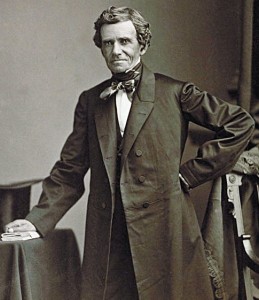
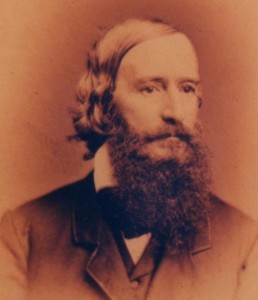
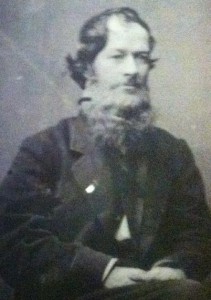
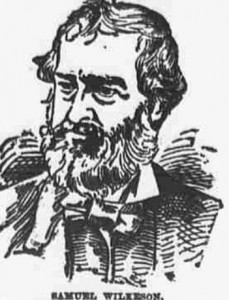
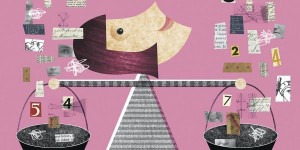
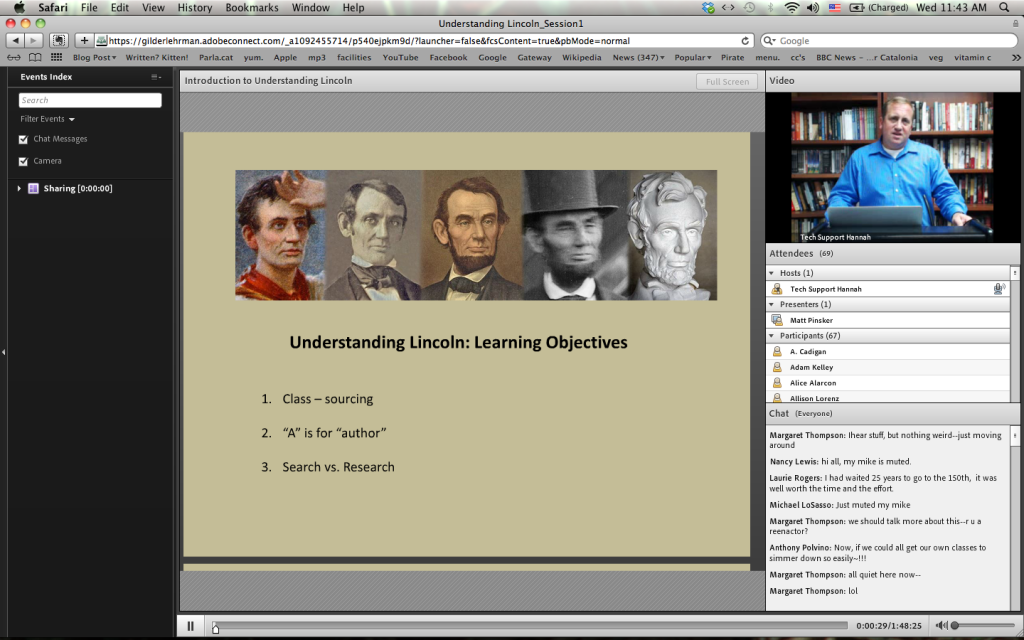
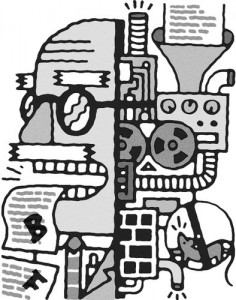

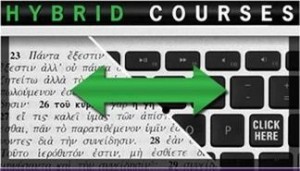

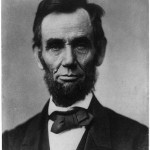
 The story of the reporter,
The story of the reporter, 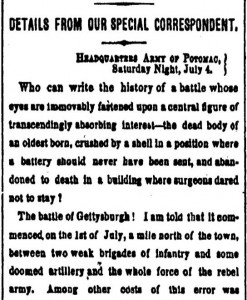
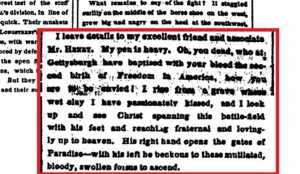
 This story raises a profound question: was Wilkeson’s “second birth of Freedom in America” a line that Lincoln was recalling and intentionally evoking when he closed his own Address at Gettysburg on November 19 with the phrase, “a new birth of freedom”? The National Park Service displays relics from Bayard Wilkeson’s death, including the sash he used as a tourniquet, and they provide a text panel showing the opening of his father’s famous dispatch (later turned into a pamphlet, Sam Wilkeson’s Thrilling Word Picture of Gettysburg), but they refrain from making any direct connections between Wilkeson’s account and Lincoln’s address. Most scholars have so far been equally reticent about making that interpretive leap.
This story raises a profound question: was Wilkeson’s “second birth of Freedom in America” a line that Lincoln was recalling and intentionally evoking when he closed his own Address at Gettysburg on November 19 with the phrase, “a new birth of freedom”? The National Park Service displays relics from Bayard Wilkeson’s death, including the sash he used as a tourniquet, and they provide a text panel showing the opening of his father’s famous dispatch (later turned into a pamphlet, Sam Wilkeson’s Thrilling Word Picture of Gettysburg), but they refrain from making any direct connections between Wilkeson’s account and Lincoln’s address. Most scholars have so far been equally reticent about making that interpretive leap.






